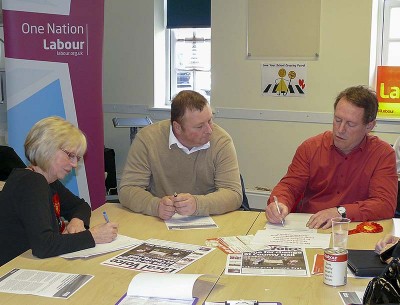
Britain has a larger proportion of low-paid, low-skilled jobs than most developed countries, and the number is likely to increase. People who work in these low paid jobs are more likely to face insecure contracts, and less likely to receive training. Labour PPC for the Wells Constituency Chris Inchley, Councillor for Shepton Mallet, says “It is now fifteen years since the National Minimum Wage (NMW) was introduced, the NMW was introduced to set a legal minimum wage, to stop what Winston Churchill said was to stop the bad employer under cut by the worse.However, since 2008 the rise in the NMW has constantly failed to keep up with inflation. In real terms it’s been going down for six years. This year the adult rise is 1.9%, against an inflationary backdrop of 3.2% RPI and 2.8% CPI.”
It is clear that higher inflation than wages has a higher impact on low paid workers as they are likely to have little or no disposable income, but face the same hikes in their bills such as energy, transport and child care costs.
The Joseph Rowntree Foundation has said “Our research shows that the cost of a minimum living standard has increased by a quarter since 2008 – thanks to rising costs and cuts or freezes to tax credits and other in-work benefits. This means the pressure to raise wages has become even greater.
Today the Trades Union Congress (TUC) has produced a report detailing the problem of low pay, it is clear that the NMW is no longer an income people can live on and it is widely recognised that a Living Wage is required, the TUC says this should be £7.65 across the rest of the UK outside London – but in some parliamentary constituencies nearly half of the people working there earn less than this.
Extending the Living Wage is vital

In the Wells Constituency 38.1% of workers are paid below the Living Wage, nearly 4 out of 10 workers are earning less than it is reasonable to live on.
TUC General Secretary Frances O’Grady said: “Extending the living wage is a vital way of tackling the growing problem of in-work poverty across Britain.
“Working families are experiencing the biggest pressure on their living standards since Victorian times. Pay has been squeezed at all levels below the boardroom and it’s costing our economy dear.
“The number of living wage employers is growing rapidly and unions are playing their part in encouraging more employers to sign up and pay it – but government must show equal initiative. We need to see a far greater commitment to pay the living wage from government and employers, and modern wages councils which could set higher minimum rates in industries where employers can afford to pay their staff more.
“During Fair Pay Fortnight we’re asking workers to back our call to MPs to get all political parties to put decent pay at the top of their agendas in the run up to the election.”
It is clear that in a decent society a person should be paid enough to sustain a acceptable living standard.
Pay is just one aspect of the low pay problem.
There are other steps that are needed to create a convincing approach to in-work poverty:
- Reduce childcare and housing costs;
- Improve the quality of part-time jobs;
- Improve training opportunities for low-paid workers to allow the opportunity to higher-paid and more stable jobs.
It is clear that this government and our local MP has failed to focus on the issues that affect low paid workers, they have failed to tackle the utility companies and their huge price hikes, not invested in child care, they have cut in work tax credits and done very little to tackle the housing crises.
Today we saw the difference between low paid workers having to watch every penny and a complacent out of touch government that sold off the Royal Mail for hundreds of millions of pounds less than it is worth to city institutions that has made a fortune.
Sadly we have a government and a MP that’s stands up for the wrong interests.
